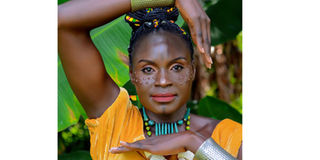Suzan Kerunen: On her album and music industry

Suzan Kerunen writes and performs African Contemporary music in Alur-Jonam (her mother tongue) as well as in English, Swahili and French.
What you need to know:
- Up-close. The award-winning multilingual Ugandan world music songstress Suzan Kerunen unveiled her fifth studio album From Ashes We Rise, writes Bamuturaki Musinguzi.
From Ashes We Rise, the 12-track-album that was released on April 29, 2022, includes From Ashes We Rise, Earthly Speaking, Ginya, Esclave (ft. Bernice the Bell), Crimson (ft. WD Alzain), and Remnants (ft. Lawrence Matovu and Keith Mugenyi).
The album that took her a year, 2021 to produce is a cocktail of Afro-fusion and reggae songs recorded in Alur, English and French with global messages including environmental protection, love and unity, and women’s rights. The album is also a testimony of the maturity of her music.
The title track From Ashes We Rise is a rallying Africans to rise up after the chains have broken and shake their bodies for the sake of the land that they love and the common tastes.
In the song, Kerunen says, “This is a chant that is calling out to all the brave and strong willed African generation, to rise up in valour and rebuild our continent out of the ashes. The ashes that have been piled by up by years of wars, corruption, diseases and poverty. It’s an anthem that is leading the brave to the fore from to reclaim their land and build it to its former glory...”
According Kerunen, the song “Earthly Speaking” is a plea to humanity to clean up the universe as it gets into a dire state. “It is a call out us to get rid of waste, air pollution, gaseous waste, plastics in the water and of course deforestation for commercial reason, but rather plant trees, protect the ozone layer and clean up the sea and other waters.”
While Esclave tackles the modern evil of sex slavery, which is eating away the female population just because they were born women. Her innocence is bought by a man. Young women are tricked into fulfilling their dreams and in the end become sex slaves.
What it means to her career
Also known as the Alur Queen, Kerunen replies: “It means a lot to me at a time like this, after the lockdowns where artistes around the world had been in a dark place, away from physical connection which affected us a lot. Being able to reconnect and sing, travel and release new work inspired by this experience and more is refreshing.”
She attributes the album and title to the life of a phoenix, the bird. “Currently, a person who makes a comeback after undergoing trauma or defeat is called a ‘phoenix.’ The phoenix was a popular bird that was believed to have had a spirit of fire. Owing to its mysterious ability to be reborn, after burning itself out completely, it is considered a symbol of strong people who keep emerging out of tough situations. I believe the pandemic was fire to all of us and we were reborn from the ashes.”
The message
Kerunen says this collaborative multilingual album boldly tells our African story. The stories consist of African triumphs, battles and more victories to come. The album is meant to give Africans a new hope despite the times. It talks about efforts that are ongoing such as decolonisation, revolutions fought, and the empowerment of the African women, the Black skin movement, not forgetting the celebration of our diversity while highlighting special ceremonies such as marriages, childbirths, rites of passage, food and race.”
The album is crafted to bring out the diversity of art through the spoken word, music, chants, riddles and proverbs, in celebration of who we are.
“It also addresses hard issues that are affecting our continent. Such issues include modern day slave trade, Black skin stigma, human trafficking, war, governance and climate change issues that keep sucking the life and blood out of Africa by global and continental perpetrators,” she adds.
The album, Kerunen says, employs African voices to tell our stories featuring some of the continents rising stars for example, Herbert Kinobe (Uganda/US), Bernice the Bell (Burundi), Mseto Nation, (Uganda), WD Alzain (Sudan Khartoum).
“I am using this collaborative album to root for a strong spirit of collaboration among African artistes while addressing continental issues to a wider audience.”
Such collaborations break physical borders and help build a movement of African ambassadors globally. It is also to encourage and develop a breed of artistes who will create art not just for self-sustenance but rather a reproductive tool for humanity.
Kerunen says Covid-19 lockdowns were a blessing for her to produce this album. “It was, but the second year, I was low and almost uninspired at the beginning, because I kept hoping the situation would get better in a month or two…but it went from mild to worse and I almost lost hope of a new day.”
She is optimistic that this sector is pulling back now that the Covid-19 restrictions have been lifted in Uganda and the world over.




